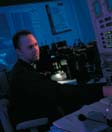 Antigen,
meet antibody Of these, HTLV-1 is the least complicated. It's spread much like HIV - by sexual contact, blood, breast milk, or sharing needles - but it undergoes fewer mutations when it makes copies of itself. It doesn't vary from person to person or even across inter- national borders. HTLV-1 from St. Croix is very similar to HTLV-1 in Tokyo. "That's a big advantage," says Torres. "With vaccines for hepatitis C or even influenza virus, variability is a problem - the viruses constantly change. You make an antibody to one virus but that virus turns into something else when it duplicates by changing key antigenic properties." "Because HTLV-1 does not mutate as frequently as HIV, the antibodies that the body generates in response to the virus have the potential to work. With rapidly mutating viruses, you can develop a vaccine to neutralize the virus, but the antibodies will only be effective before the virus mutates." The virus-cancer connection has long been a source of scien- tific investigation. Researchers have long known that retro- viruses can cause cancer in animals. It was 1980 before the first human cancer/retrovirus connection was established with the identification of HTLV-1. Retroviruses contain oncogenes that can be transferred during replication. They can alter their host's chromosomes just enough to "switch on" oncogenes that cause cells to grow out of control. Top right: To creat an HTLV-1 vaccine, researchers will harvest antibodies from monkeys, who are also susceptible to the virus.
Home |
Table of Contents |
To our Readers |
Building on Basics UC Davis Health System | © 2000, 2001, 2002 UC Regents. All rights reserved. |
  |
